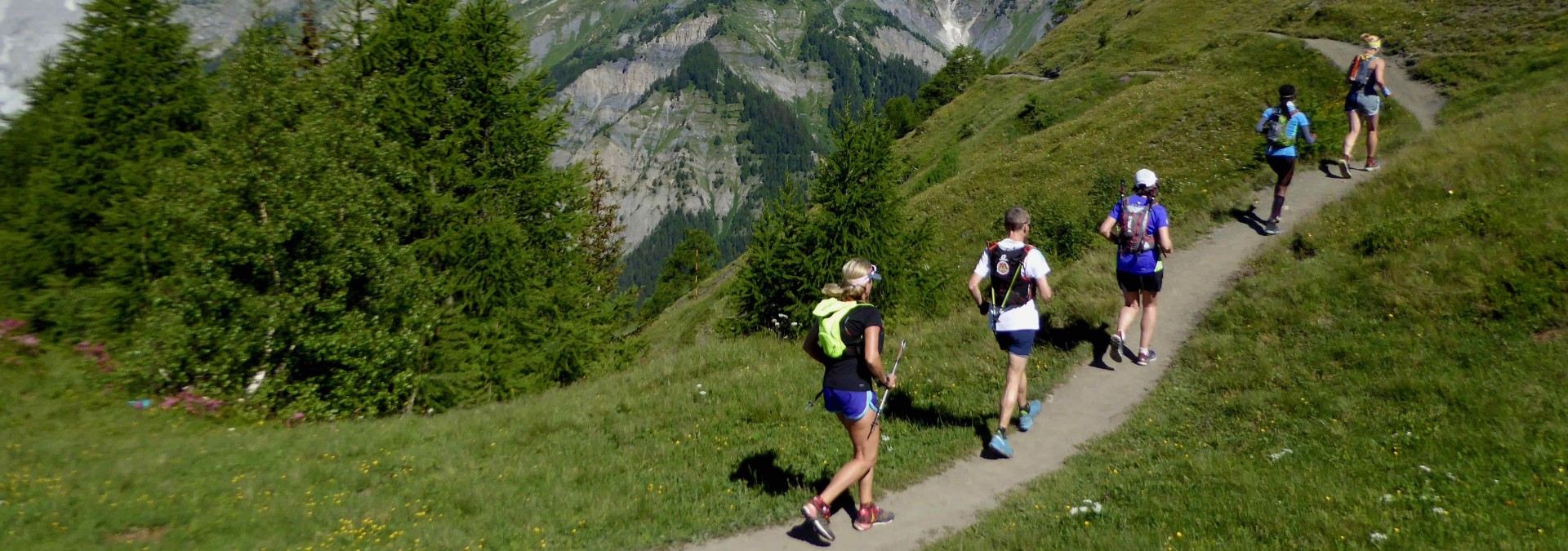
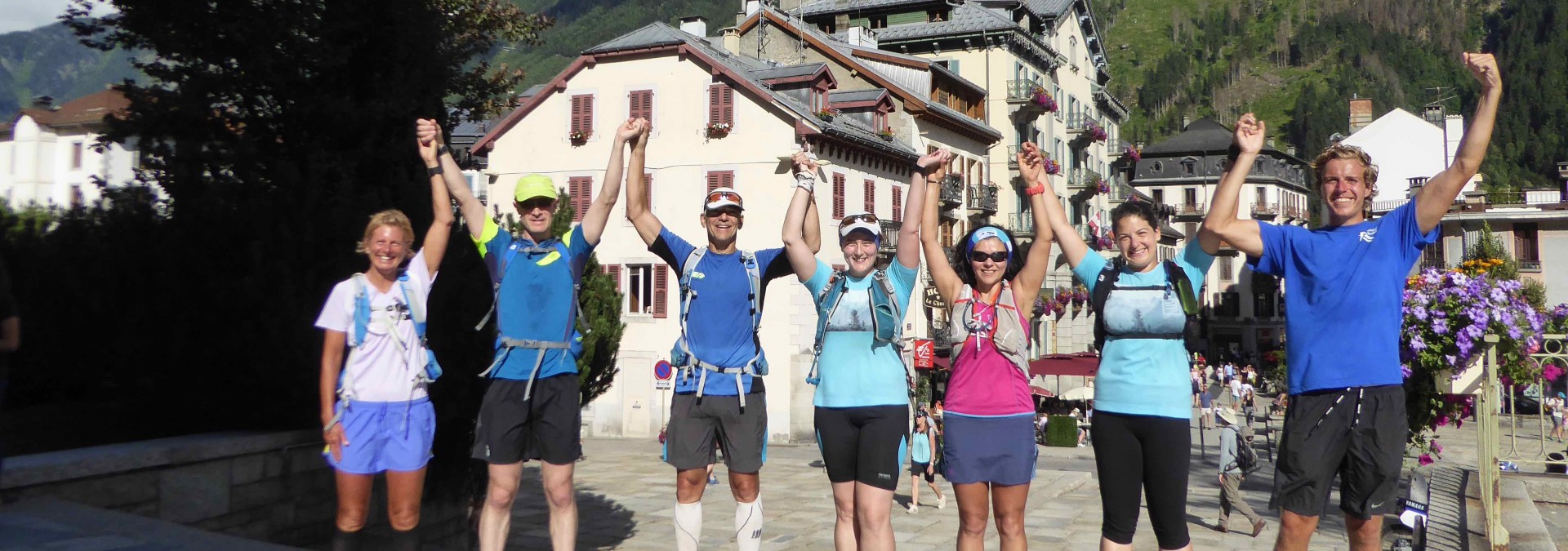
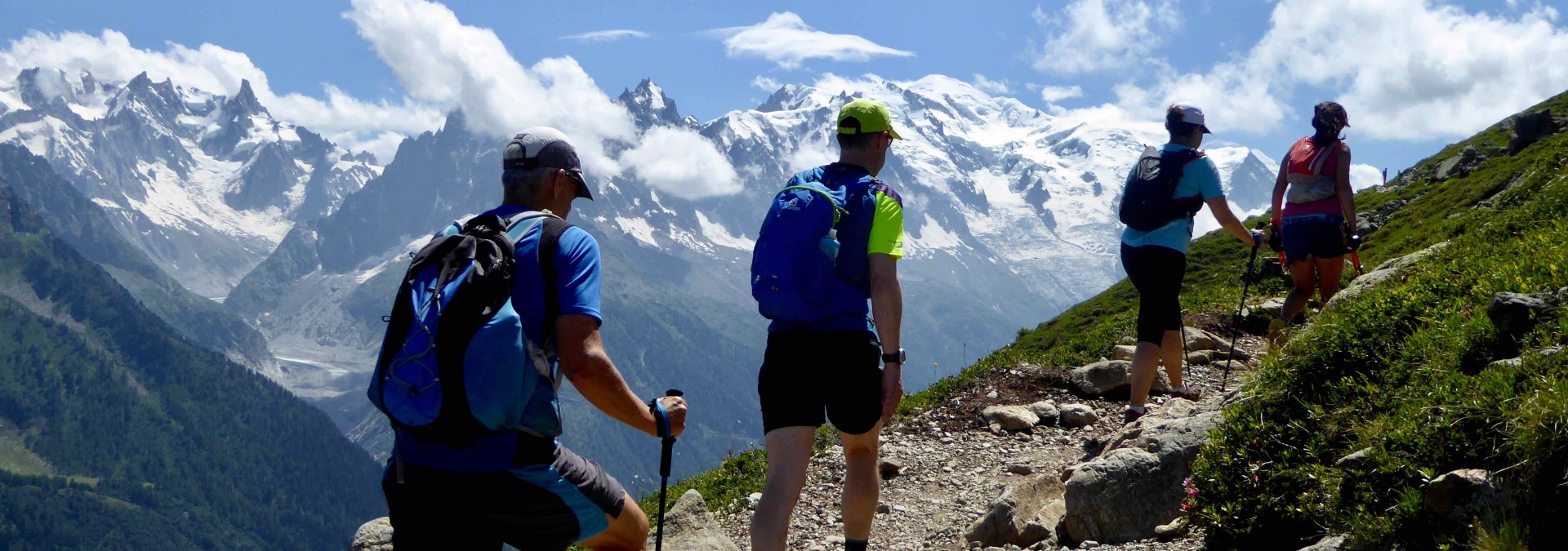
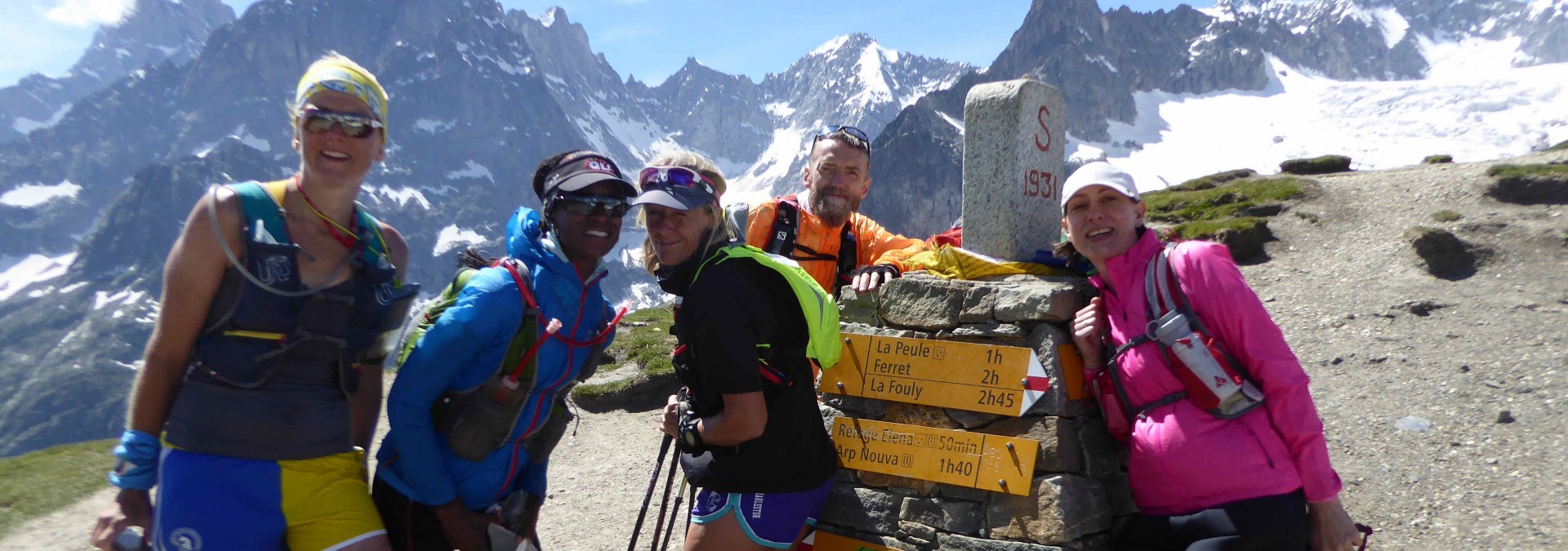
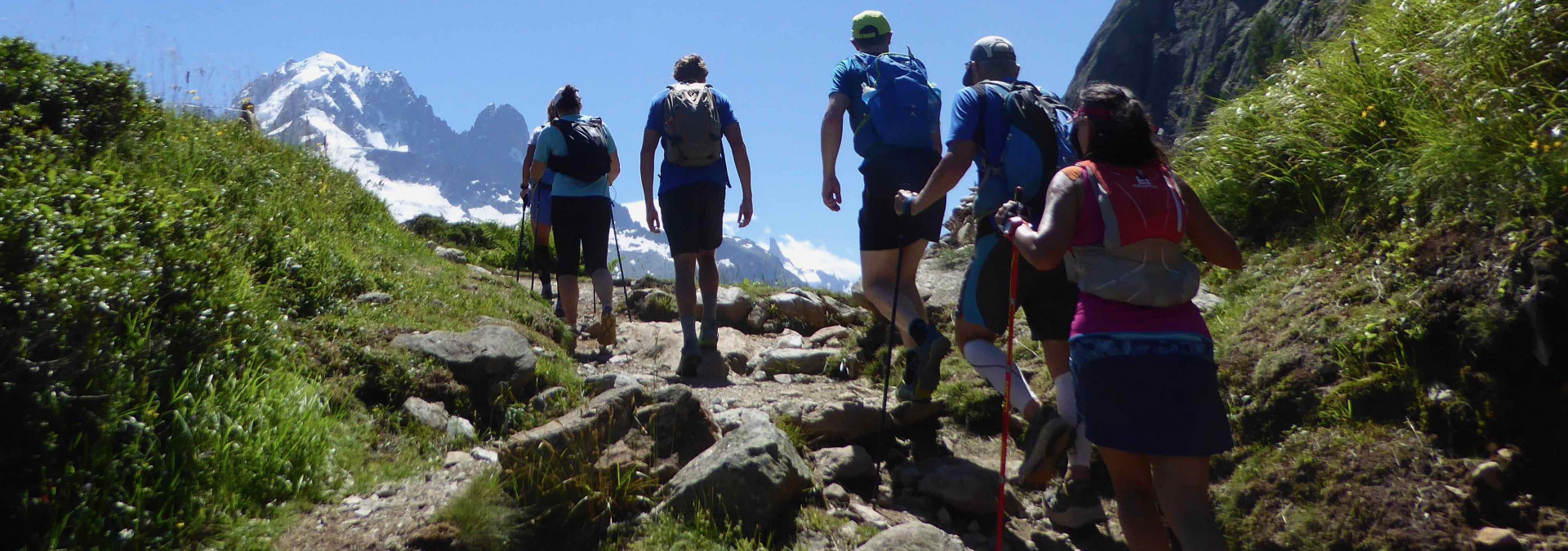
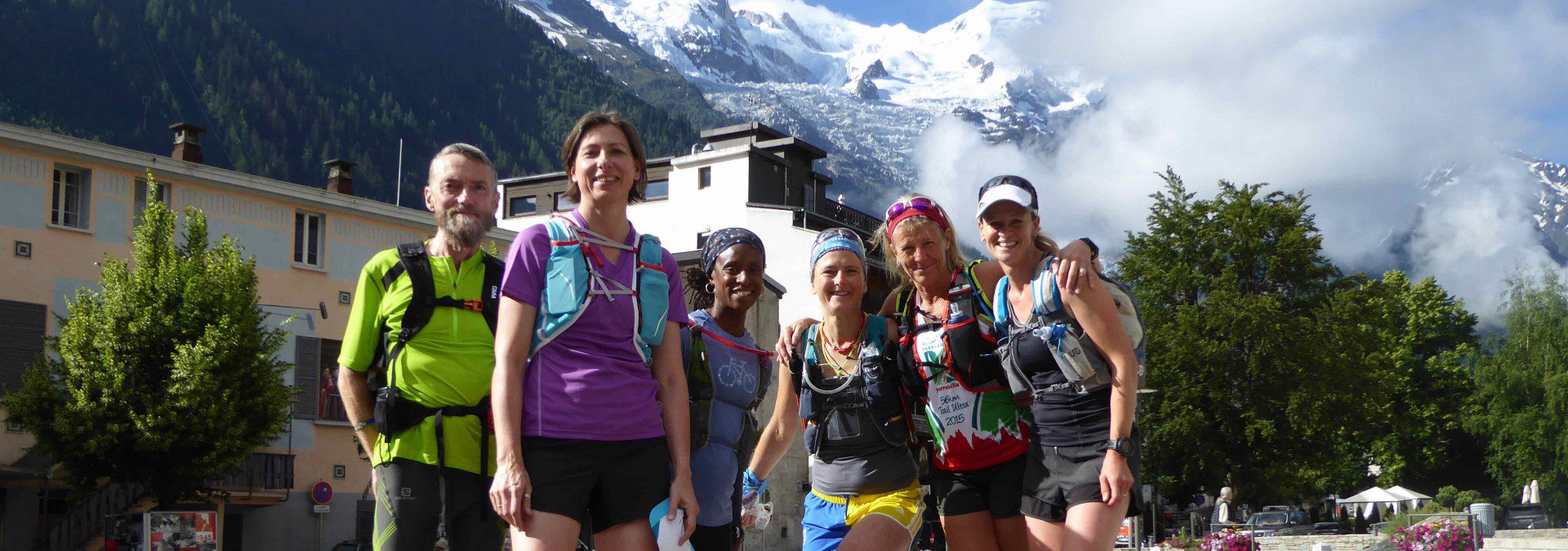
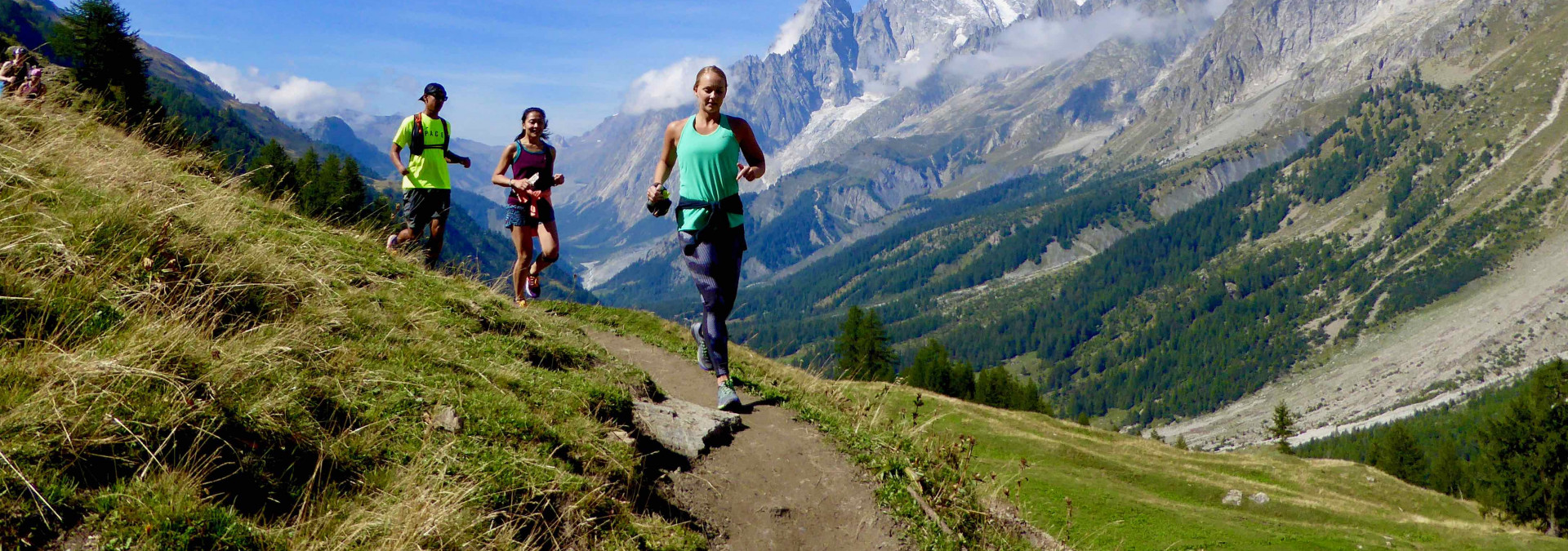
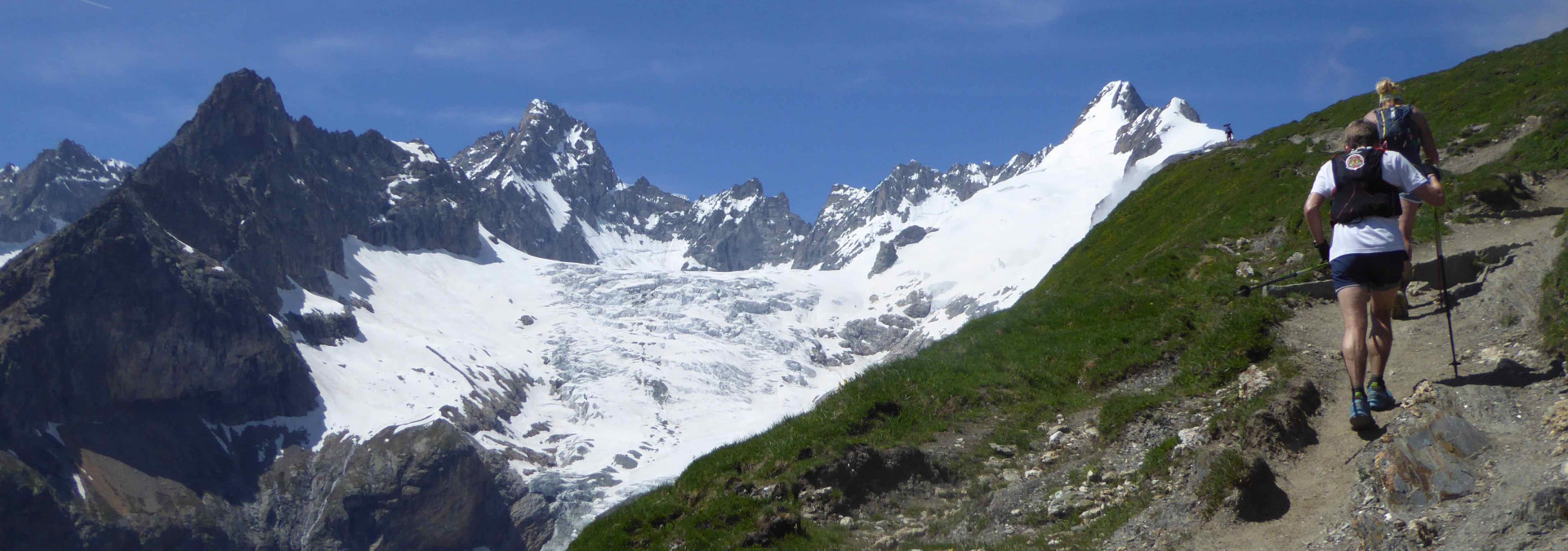
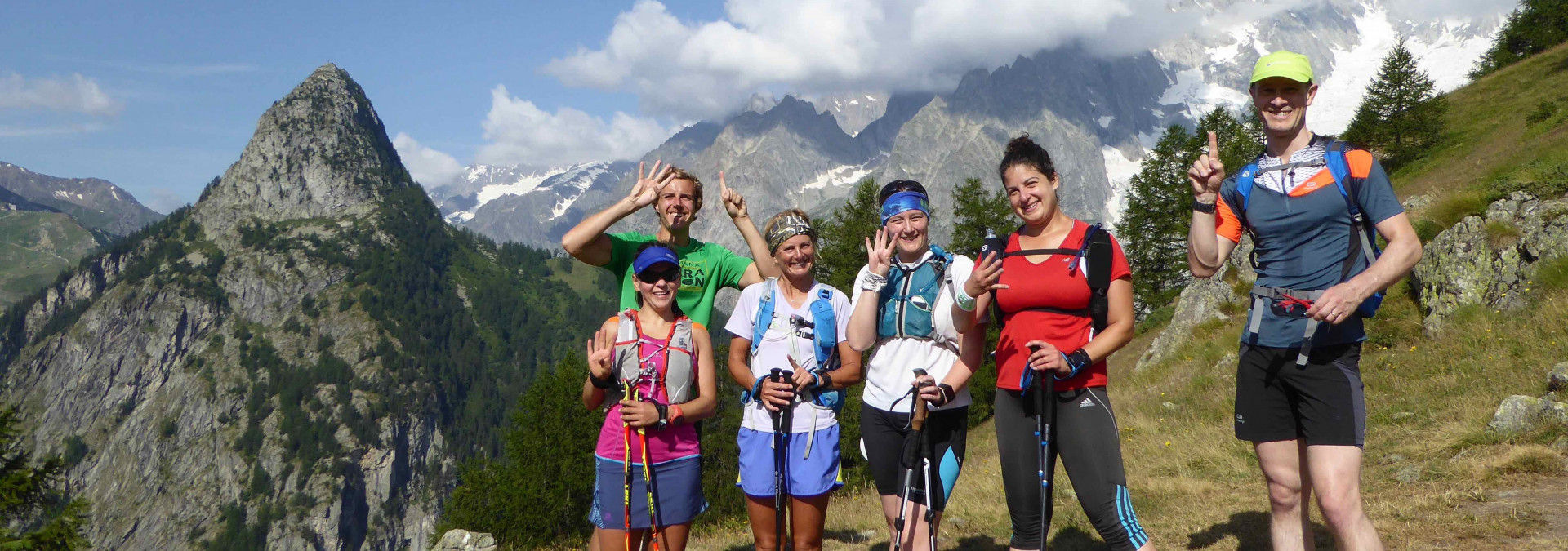
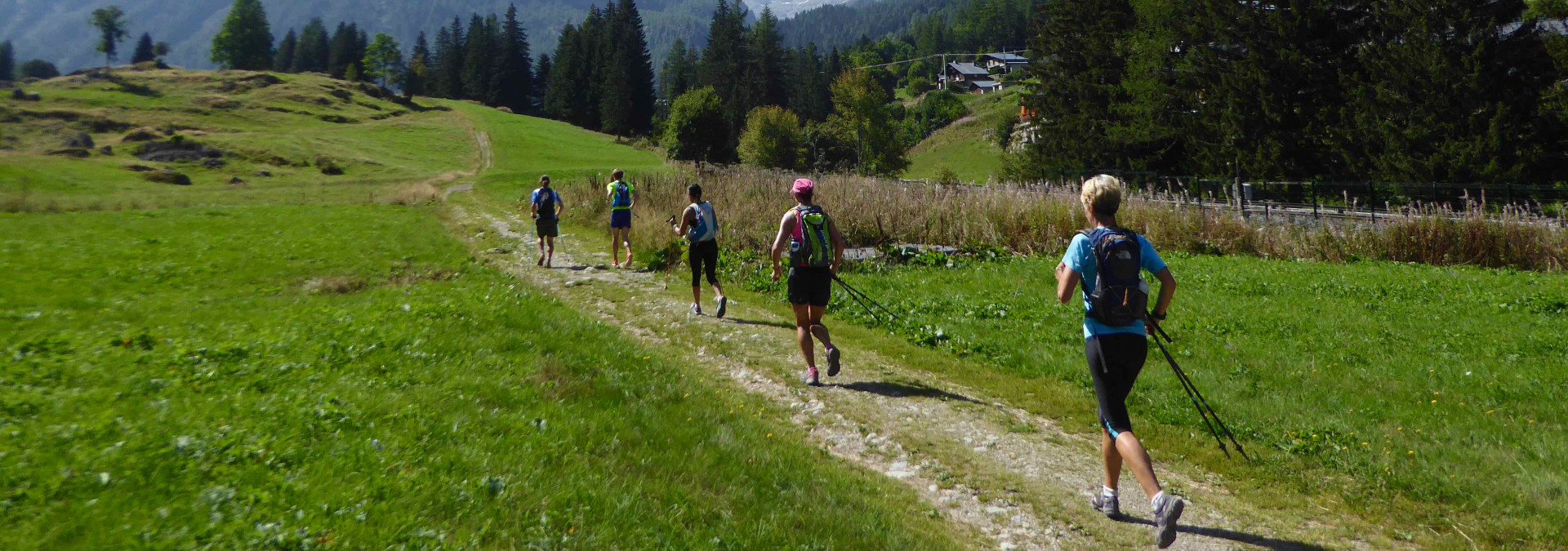
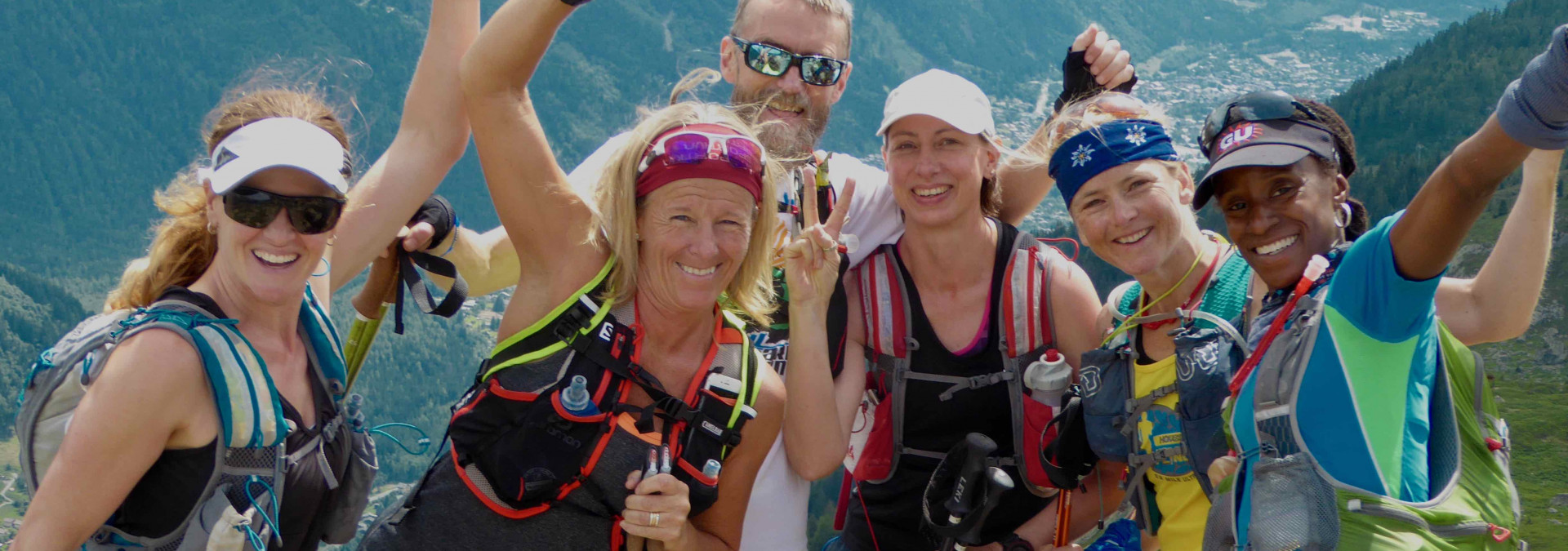
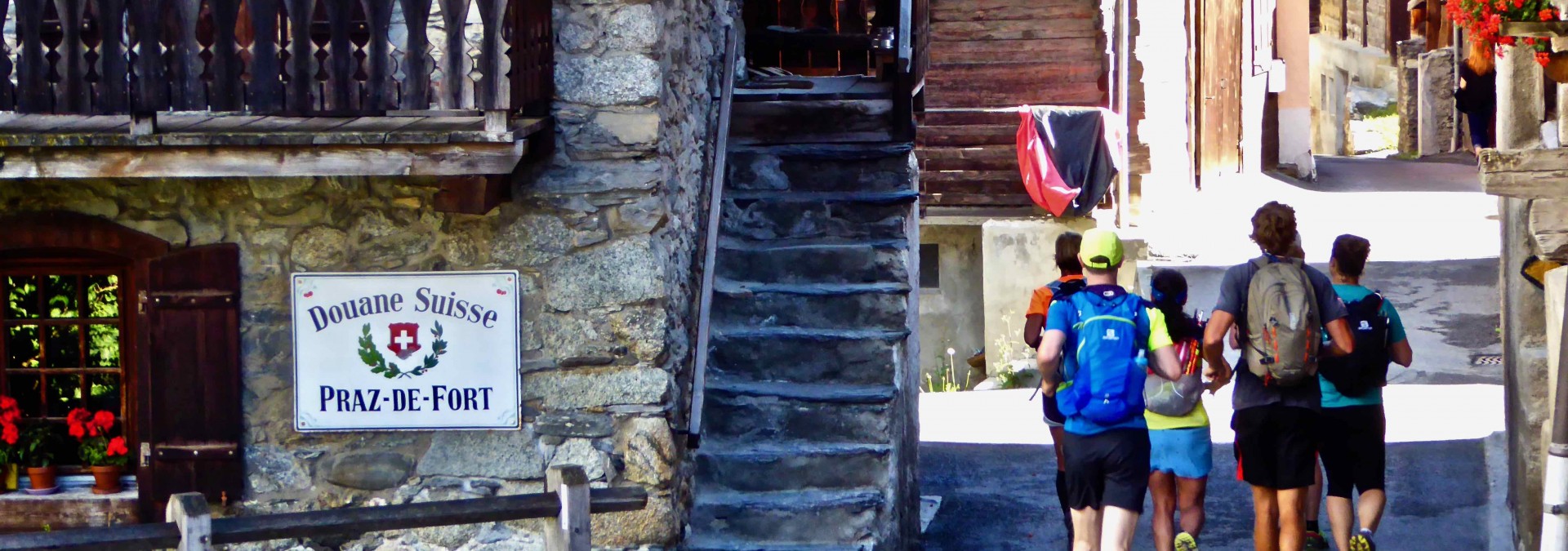
The legendary Mont Blanc, crown of the Western Alps, is one of the most iconic mountains in the world - and the trails around it are a dream for runners. Over three unforgettable days, you’ll traverse a section of the famous Tour du Mont Blanc, linking Courmayeur in Italy, Champex in Switzerland, and Chamonix in France.
We move at a steady pace, blending smooth running with fast hiking on steeper terrain. The route takes us through spectacular alpine scenery, alive with history, culture, and folklore. Many of these trails date back centuries, once trodden by hunters, herdsmen, smugglers, and armies.
Expect a mix of flowing runnable paths and more technical, rocky high passes - each rewarding you with breathtaking panoramas. Meadows bursting with wildflowers tumble into traditional hamlets and villages, while towering peaks frame every horizon.
This is more than just a run - it’s a journey through the very heart of the Alps, a true paradise for trail runners and nature lovers alike.
This is one of the world's most famous long distant hiking trails, and in recent years has become even more famous, as part of the route of the mythical running race the Ultra-Trail du Mont Blanc® (UTMB®). The 'CCC' race which is part of the UTMB® week covers 101km (63 miles) and climbs 6100m (20,008ft). The record for the fastest time is 10h30! Each year, the route on the first day of the CCR varies slightly from the preceding year. Your guide will choose the most appropriate route for the group.
We would like to reassure you this is a holiday, and therefore we spend three days running the route and taking time to enjoy the mountains. Each day we will run/hike along the route, with at least one high mountain pass. We’re likely to be on our feet for 6-8 hours per day with lots of ascent and descent on a variety of mountain trails. This trip is suitable for experienced mountain trail runners.
Our trail running holidays include running from Chamonix to Courmayeur and beyond but for this one we run from Courmayeur to Chamonix!
CCC was a breathtaking, challenging, inspiring, bucket list adventure! This experience was something I never thought I would do, but am so grateful for it! Amazing to run in the Alps with new friends from all parts of the world and share this beautiful experience! Each day brought something new to appreciate. Fun to see where to elite athletes run the UTMB, but have my own special memories on the trails too!
There is not one single element I can say I did NOT enjoy. It was an amazing experience. I was expecting to find it difficult and was not sure if my experience was right for it. But it was which made it even more enjoyable!
An amazing holiday that was well organised, with an amazing guide. We stayed in stunning hotels, in stunning locations, and well feed throughout the week. The luggage being transported removed the stress from the week and left me to enjoy the holiday. Tracks and Trails, highly recommend.
Fantastic trip and a stunning route. The views were stupendous and everything was very well organised with great accommodation. The trip enabled me to achieve a huge ambition.
Finished! It was a longterm goal and aspiration to do it, so achieving it was such a positive emotion. Every day was amazing in it's own way, with all of them memorable. I loved seeing Champex Lac as this seems iconic when watching the UTMB races.
What an amazing trip! Tracks and Trails took care of every logistical detail so that you can focus only on experiencing the stunning landscape. Highly recommend. Our guide had so much energy, so knowledgeable, and wise! What a great trip! She catered to our every need and customized for ability extremely well.
Your running guide will meet you this evening, at approximately 1800 hrs, at your hotel in Courmayeur in Italy to answer any last minute questions and to brief you on the days ahead. This trip is run in conjunction with our Mont Blanc Ultra Trail holiday and you may find that you are joining a group that will have left Chamonix, in France three days earlier.
Setting off through the streets of the ancient Roman town of Courmayeur, we run up a gentle hill through hamlets of ancient wooden buildings with traditional architecture. We soon leave the tarmac behind to climb steeply through the shady larch forest and into the mountains via a zig-zagging trail which is mostly in shade. We then traverse a beautiful trail around the mountain, often taking in several small summits, which in our mind offers the most incredible views of the Mont Blanc mountain range, a truly amazing trail run. Eventually, we reach the famous Rifugio Bonatti, a gorgeous refuge dedicated to the mountaineer and photographer, Walter Bonatti. The trail continues through the alpine flower meadows before descending to Arnuva, and then there is a long, but steady climb to the Swiss frontier at the Grand Col Ferret. The wide, runnable trail descends and then traverses along the hillside before dropping down to the lovely Swiss village of La Fouly at 1600m where we will spend the night.
*Ascent: 2050m (6724ft) Descent: 1670m (5477ft) Distance: 31.6km (19.7 miles) Duration: Run/Walk 8h00-8h30
The distance can vary depending on the race route set for that year.
Leaving La Fouly we have a gentle start to our day as we take a valley trail that runs alongside the river. Everything is very 'Swiss' today, immaculate ancient chalets, perfectly manicured lawns, and orderly geraniums in window-boxes. We make our way down the valley on great trails until we reach the village of Praz de Fort which has wonderful examples of traditional, and very old, wooden chalets and farms. There is a convenient little cafe by the roadside which is sometimes hard to run past! It may be time for a drink? At this point we begin our ascent for the day as we climb steadily uphill to the lakeside Swiss village of Champex with its jade green waters. As we leave the village behind, we once again enter the larch forests, gorges and the pastures, home in the summer months to the famous Swiss fighting cows. After taking in stunning views of the Rhone Valley, we run a steady descent to the Col de la Forclaz and then onto Trient at 1300m (4265ft) for our overnight stop.
Ascent: 1310m (4296ft) Descent: 1585m (4542ft) Distance: 30.9km (19.3 miles) Duration: Run/Walk 6h30-7h30
A grand finale today as we complete our CCC and cross back into France. We make the first of two bigs climb out of the Trient valley through thick forest until we reach the alpage of les Tseppes and a clearing to gain views of the Trient glacier. Soon the trail and crosses back into France and after the alpage of Catogne descends down towards the Vallorcine valley and village. Famous as the 'valley of the bears', where in the Middle Ages the locals used to pay their taxes in bear meat! Sadly, and perhaps not unsurprisingly there are no bears left today. After Vallorcine, we have a short uphill to the Col des Montets before facing the steep zig-zags to the Tetes aux Vents at 2127m (6976ft). The views en route of the Mont Blanc massif reward our efforts as we reach the last high point of the tour. We now make our last descent into Chamonix! The trail is quite breathtaking as it gradually traverses and descends you see the panoramic trail of the Mont Blanc massif unfold. A final stop at the Flegere cable car station then we drop into the woods heading for Chalet la Floria and then the mountain town of Chamonix, in France. Time to celebrate, rest the body and recover with an optional massage.
Ascent: 1750m (5740ft) Descent: 2215m (7265ft) Distance: 30.5km (19 miles) Duration: Run/Walk 7h30-8h30
Today is departure day and your trip ends after breakfast.
It is always our aim to complete the proposed itinerary outlined above, however, it may be necessary for our guides/instructors to adjust the daily itinerary based on the weather conditions, group safety and enjoyment.
On all our trips we aim to accommodate our guests in well-situated, clean, characterful, family run accommodation. We are painstaking in our research to give you the best option possible and one that is good value. Our suggested accommodation, listed below, is subject to availability at the time of booking. We have given details of our favoured venues and those we intend to use. If unavailable we will book alternative accommodation of a similar standard.
All of our trips are based on two people sharing a bedroom, what we call a 'twin' means two single beds in one bedroom. If you are travelling on your own your booking will be based on a twin bedroom sharing with someone of the same gender. On some occasions when accommodation is limited at the time of booking mixed shared 'dormitory' style accommodation will be booked. Note that it is very rare to have air conditioning in European mountain areas, and most bedrooms do not have this facility.
However, on many of our trips single rooms are available on request for a supplementary fee. We recommend booking as early as possible to secure a single room as these are always limited in number. Please contact us for details.
The Hotel Edelweiss is right in the heart of Courmayeur with easy access to the town centre, while being tucked away in a quiet street where you will not be disturbed by the crowds. The hotel has a lovely sunny garden area at the front, and a spacious lounge bar to enjoy a drink. All the rooms are en suite and dinner is very Italian with local dishes and plenty of pasta. Other hotels which we use in Courmayeur include the Hotel Bouton d'Or, and the Hotel Walser.
In the heart of the Swiss Valais, Maurice & Mauricette, have been welcoming guests to the friendly Auberge des Glaciers for over 10 years. Upon arrival enjoy an ice cream or cold beer on the veranda with fabulous views of the le Fouly valley and this quiet corner of the Mont Blanc massif.
In the charming Roman town of Martigny, canton of Valais, on the crossroads between north and south, the mARTigny boutique hotel is the result of a partnership with the Pierre Gianadda Foundation. The hotel blends stylish, art-inspired rooms with warm, inclusive hospitality. Its Peruvian restaurant, La Cordillère, is a local favourite—serving bold, creative dishes alongside Valais wines. Just a short walk from museums, Roman ruins, and vineyard trails.
The Heliopic Hotel and Spa is located in the centre of Chamonix at the foot of the Aiguille du Midi cable car. We love the look and feel of the 4-star Heliopic hotel for it's modern but traditional design. Wooden architecture, luxury rooms, in house restaurant and a NUXE spa make this a fabulous all year round retreat.
For most trips we book the bright and comfortable 'Standard' rooms. These accommodate up to two people in either a twin or double bed. Each room has a cosy feel with wood panelling and a balcony, storage space as well as cosy bedding with soft pillows and duvets. The facilities include: a bath, hair dryer, Nespresso coffee maker, kettle and teas, high speed wifi and bathrobe and slippers for the spa. Single rooms are available.
Enjoy free access to the Nuxe Spa. Go for a relaxing dip in the indoor lap pool, experience the ice cave, bubble bath, cold-water baths, hammams, sauna and tea room! Treatments and massages can be booked via the hotel reception.
Arrival
Our meeting point for this trip is in Courmayeur, Italy which can be reached by road via the Aosta Valley or France (via Chamonix or the Petit St Bernard pass) or Switzerland (Grand St Bernard pass).
By bus/train via Milan or Turin (in Italy) or via Chamonix in France (via the Mont Blanc Tunnel).
It's possible to fly to one of the Italian airports:
Or fly to Geneva Airport (Switzerland) and take a bus all the way to Courmayeur via Chamonix or use a smaller transfer company that will drop you at your hotel.
Reaching Courmayeur from Geneva airport via Chamonix is straightforward with many transfer companies operating this route throughout the day. Either consider a scheduled bus which will drop you at Chamonix Sud Bus Station, such as easybus.com, or use a private transfer company such as Haute Transfer, or Mountain Drop-Offs which will drop you at your accommodation. If booking with Mountain Drop-Offs you receive a small discount on the route by using our company code of TAT01. This code only applies to transfers in ’normal’ working hours. It does not apply to early morning, or late evening transfers.
IMPORTANT: the Mont Blanc tunnel will be closed between September and December for necessary maintenance work. (This work is due to start in 2023 and to last for up to 18 years). So if you are joining our September trip then you must travel to Courmayeur via the Aosta Valley options (not the Chamonix side).
Departure
You will finish your trip in Chamonix which is in France.
A range of travel options to leave the Chamonix valley can be found on the Chamonix Tourist Office website.
If travelling via Geneva we recommend that you book a seat on a shared transfer which is a door-to-door service to reach your accommodation in Chamonix. We recommend Mountain Drop Offs, Chamexpress and Haute Pursuit for this service. Easybus also runs a service from Geneva airport to Chamonix Bus Station. This service runs throughout the day, but does not collect you from your hotel.
Please contact us if you need further advice on your specific travel requirements.
Activity, Injury and Mountain Rescue
It is a condition of booking that you are insured against medical expenses, injury, illness, death, cost of repatriation and personal accident risks. For all of our trips your insurance must also cover mountain rescue. The exception to this is if the trip is being held in the United Kingdom or Norway where mountain rescue is free of charge. Please ensure that your insurance covers you to the maximum altitude given on your trip itinerary. The maximum altitude for any trip can be checked on the 'At A Glance' box on each trip page.
Trip Cancellation/Curtailment Insurance
You should also have insurance to cover trip cancellation and curtailment. Insurance should be booked as soon as we have confirmed that your trip is going ahead. Note that your deposit and balance payments are non-refundable unless it is Tracks and Trails who cancel the trip due to a failure to reach the required minimum numbers. In this case we will offer you a refund or the option of transferring to another trip if one is available. We also advise that you should have insurance which covers baggage loss/equipment damage as Tracks and Trails will not be held responsible for loss/damage to baggage/equipment.
It is entirely your own responsibility to ensure that any insurance taken out is appropriate for your trip and for the activity you will be undertaking. Tracks and Trails cannot advise on insurance policies and cannot be held responsible if in the event of a claim your insurance is inadequate.
All of the above insurances are detailed in our Terms and Conditions. For further details, please read the Insurance section on our website.
Summer mountain weather in the European Alps can vary considerably, and in this respect it is no different to any mountain environment where the terrain influences the weather and it can change from valley to valley.
However, in the summer months it is generally good in the Alps, but it can deliver everything from glorious sunshine, to rain, fog, high winds and even snow. Temperatures can reach over 30°Celsius (86°F) in July and August, but can drop to 5°Celsius (41°F) on the high passes, or 'Cols' as they are known in the Alps. Essentially, as with all mountain journeys, you should be prepared for any eventuality. The average temperatures range from 15-25°Celsius (59-77°F) in the valleys and 5-15°Celsius (41-59°F) on the passes.
Even in mid-summer we can be faced with overnight snow especially when we have spent the night in a mountain refuge/rifugio/hut at higher altitude.
When packing for a trip in the mountains it is important to have appropriate equipment and clothing. This kit list features items we believe are necessary for the weather you might encounter and accommodation you will be staying in. If you have any questions with regards to what to bring, do not hesitate to get in touch with us.
Equipment
Clothing
You must be able to cover yourself with 3 full layers on your upper body and 2 full layers on your legs
Comfort
Personal First Aid
Documentation
Additional Items
Check out the What kit to bring Blog post on our website for further advice on:
Your luggage will be moved each day by a taxi driver. The legal maximum weight limit is 15kg (33lbs) per person. If your luggage exceeds this limit it will not be collected. You can take only ONE luggage bag on the trip. Not all hotels have 'lifts' and you must be able to carry your luggage upstairs.
**Supplementary snacks if you follow a gluten free or coeliac diet**
Leaders are all first aid trained and will carry their own first aid kit
On many of our trips there will be an element of 'group kit' which will be shared amongst our guests. As mountain people you will be used to team work and working together to the mutual benefit and safety of the group. The 'group kit' will be minimal and usually just a case of sharing a few lightweight 'survival shelters'. For example on a week-long trip you may carry a small shelter for just one day before passing it on to the next person. If you are booking a trip in winter there will be a few additional safety items. These will be distributed in such a way that no one is over burdened. Other group items necessary for safety and comfort will be carried by your guide/instructor.
If you are planning to run the 'CCC' you will find that this week offers runners invaluable endurance training and race route knowledge. Our local running guides have in-depth knowledge about the course, the terrain, and how to prepare. It’s also a perfect chance to test out your clothing, equipment and nutrition plans.
For each of our trips a minimum number of guests is required before we can confirm that your trip will go-ahead. The minimum and maximum number of guests on your trip is displayed in the 'At a Glance' box on the righthand side of the trip page.
We strongly advise you do not book travel until we have confirmed your trip is 'guaranteed' to run. If you book travel before we have confirmed it is 'guaranteed' we cannot be held responsible for any financial loss if the trip does not go ahead.
When booking a holiday as a solo traveller a twin bedded room comprising of two single beds, is booked as standard. This will be with someone of the same gender unless you request to pay extra for your own room. Single rooms are often limited in supply so if you would like to pay a supplement for a single room we urge you to get in touch as soon as possible. This trip has a single supplement of £300 in 2026 and £310 in 2027.
We go to great lengths to work with first class guides who are passionate about their work. They are all fully qualified, insured, and hold the correct documentation.
Please note your guide has complete discretion to make a daily decision on whether or not to take the advertised route based on the weather and the ability of the members of the group. They have our authority to make any route changes they believe are necessary in the interests of safety and enjoyment.
Your trail running guide will be a fully qualified and experienced International Mountain Leader. International Mountain Leaders are not only qualified to ensure the safe management of the group, but are also a source of knowledge about the local flora and fauna, and traditions of the area which you are visiting. For our trail running trips we employ International Mountain Leaders who have a particular passion for trail running. Many of our trail running guides have competed in mountain marathons, and ultra marathons in the European Alps and further afield.
You can learn more about our guides and instructors on the About Us page.
Your luggage will be transferred daily to the next accommodation and you only need carry a small/medium sized 'rucksack' for items you need during the course of the day. Please refer to the kit list for guidance on the size of rucksack required.
Your luggage, ONE bag per person, will be moved along the route by taxi and should not exceed the legal maximum weight of 15kgs (33lbs). If your luggage exceeds this weight limit it will not be collected and will be left behind.
Be aware that you will have to carry your luggage to your bedroom, which may involve climbing several flights of stairs as not all hotels have elevators. Luggage on wheels is generally a good idea, and the taxi companies prefer a soft bag. They cannot accept responsibility for damage to any hard-shell suitcases. You are asked to avoid leaving valuables in your luggage, fragile items, personal medication or official documents, such as passports.
If your trip begins and ends at the same hotel in Chamonix it is possible to leave extra luggage at the hotel for your return. However, we cannot guarantee at this point in time that we will be using the same hotel at the beginning and end of your journey as it depends on availability. Contact us for details.
Your bags will be collected each morning at 0800 hrs and if your bag is not ready it will not be collected. The bags will be delivered by 1730 hrs to your next accommodation. Earlier delivery cannot be guarantee due to the volume of luggage moving around the Tour du Mont Blanc.
We recommend that you consider a device such as an "AirTag" which allows you to track your luggage in the event of it being misplaced.
We do not include lunches in your trip fee for various reasons, the most important of which is food waste. In general our guests have particular tastes and requirements for 'trail' or 'hill' food and it is better you purchase your own snacks rather than throw away items from the picnic lunch which we would supply.
Lunches on our trips are 'picnic' style lunches, in other words you take a packed lunch with sufficient snacks, food and fluid to sustain you throughout the day. Buying snacks and trying local specialities is a great way to inter-act with local people and to practise your language skills.
If there is the possibility of lunch being taken at a restaurant/farm/cafe beside the trail, your guide/instructor will advise you of this. Each evening you can order a picnic or a sandwich from the hotel, or your guide/instructor will advise you of other options such as a local shop or market. In all cases we would ask you to settle any 'bill' for lunch or drinks the evening before you depart, and not in the morning when there may be a queue.
On your itinerary you will find an indication of the amount of ascent and descent you can expect each day. This offers a guideline to how much effort might be expended each day and allows you to decide, based on previous experience, if your fitness and stamina are correct for the trip.
We make every attempt to ensure these statistics are as accurate as possible, but ask you to note that the most modern of technology used to record these details can show considerable variations in terms of ascent, descent, and in particular distance. In other words no two people using GPS devices on the same route will have exactly the same details recorded at the end of the day.
The statistics given should be used as a 'general' indication of the effort required.
Your leader will carry the correct maps and you are not expected to navigate, but if you would like to have maps of the itinerary you will find that those listed below cover your itinerary:
IGN 3630 OT: Chamonix Massif du Mont Blanc 1:25,000
Or if you would like to see the entire Tour du Mont Blanc route:
IGN 89025: Tour du Mont Blanc 1:50,000
It is useful to arrive at your destination with some cash in the local currency, however, on most occasions it is relatively easy to visit a 'cash machine' after arrival and withdraw money on a credit or debit card. Some of our locations are an exception to this where the accommodation will often have no facilities for withdrawing cash, but they will take a credit card.
On many of our trips we will visit remote cafes/farms where it is wonderful to enjoy a drink and a cake, at places such as these they will often only accept payment in the local currency in cash.
Food
On all of our trips we encourage you to experience local tastes and dishes.
If you are vegetarian catering for your diet is not generally a problem. If you have a 'special' diet because of an allergy/intolerance we would ask that you make your needs clear on your booking form so we can discuss your requirements with the accommodation. A diet that is not related to an allergy/intolerance or beliefs cannot be catered for. It is simply not possible for mountain accommodation to deal with many variations in diet while providing meals for groups.
In addition, if you have an allergy/intolerance we would suggest you bring/purchase suitable snacks as a supplement to the picnic lunches. At times finding gluten free bread, for example, can be an issue. If you would like to discuss the suitability of a trip for a vegan diet, gluten or lactose intolerance please contact us.
We request that you do not CHANGE your dietary requirements during the trip as we will have pre-ordered your meals.
Water
If any of the accommodation has a problem with their water supply they will normally post a sign over the tap indicating that you must not drink the water, otherwise it is normal to drink water from the tap. Hotels - In some countries it is not uncommon for restaurants to charge for tap water at the evening meal. If this is the case then Tracks and Trails will cover the cost. Mountain Huts - If your trip features a stay in a mountain hut/refuge and the tap water is not potable then Tracks and Trails will cover the cost of bottled water at the evening meal. Sparkling water is not included in this option and any cost should be covered by you.
A passport with 6 months remaining validity at the end of your stay is generally required. Please check the relevant embassy or consulate for the country you are visiting, paying attention to your citizenship. It is your responsibility to ensure that you have the correct travel documents and visas for your holiday. Visa requirements and charges are subject to change without notice.
New European Travel Regulations from mid 2025
If you are a guest travelling to one of our European holidays you may be impacted by a significant change to travel regulations expected to be in place from the middle of 2025. The new EITAS scheme will start operating this year and, whilst a start date is not yet confirmed, it is likely to affect our summer holidays in 2025 and any winter holiday thereafter. As your holiday approaches we recommend that you check for updates on the website HERE.
We ask that you carry a paper copy of your passport with you on your trip. We suggest keeping your passport in your rucksack, and a paper copy of your passport in any luggage you might have. If your trip is without luggage transfers then keep a paper copy somewhere in your rucksack, separate from your original document.
We recommend you check if you require an adaptor for your electrical items at:
Plug, Socket & Voltage by Country
Note that if your trip involves staying in a mountain refuge/rifugio/hut that electric sockets may be in short supply and for that night you may not be able to charge any items. Although the accommodation will have electricity this will often be supplied by solar panels or a generator and limited to use by the staff. For this reason we advise that carrying a small slimline and lightweight 'battery pack' can be very useful for recharging phones which many of you will also use as your camera.
Tracks and Trails pays guides/instructors a fair and appropriate fee for their professional service. However, if you feel your guide/instructor has provided an excellent service that went 'above and beyond' then it is at the discretion of each guest whether to tip or not. Guests will often give a tip of between 2 - 5 per cent of the total value of their trip. It is entirely up to you and any gesture will no doubt be appreciated no matter the size.
Before booking consider whether you expect to be in the appropriate physical condition on the date of your departure to allow you to fully participate in and enjoy your holiday. If you have any doubts because of an illness or injury it would be advisable to check with your doctor.
For UK residents travelling to an EU country you should obtain and bring with you a free Global Health Insurance Card (GHIC). This entitles you to state provided medical treatment in certain European countries, but is not a substitute for medical travel insurance.
If you have a UK European Health Insurance Card (EHIC) it will be valid until the expiry date on the card. Once it expires, you’ll need to apply for a GHIC to replace it. The UK Global Health Insurance Card (GHIC) lets you get state healthcare in Europe at a reduced cost or sometimes for free. Please check this before departing. We advise that you always carry your insurance documents with details of the Emergency Medical telephone number for your insurance provider, and your policy number.
We feel strongly about protecting the environment and do not encourage the use of single-use plastic items. We would ask that you arrive with a ‘water bottle’ or ‘hydration system’ that can be used repeatedly. We would point out that we operate a ‘zero tolerance’ for rubbish, and would ask you to remove all your rubbish items from the mountain even those you consider to be bio-degradable. In particular we ask that you remove any toilet tissue.
In the mountains the 'waste water' in refuges (huts) often runs into the nearby streams and rivers with potential impact on the eco-system, though in many places steps are now being taken to avoid this. Whether or not your trip involves staying in a mountain hut we would nevertheless recommend you consider nature friendly sunscreens which only contain mineral UV-blocking ingredients such as oxide, and titanium dioxide.
You can read our full policy here.
Working across international boundaries, and with various currencies means that the price of our trips can change overnight. We have, however, undertaken to guarantee that once you have paid your deposit the price of your trip is fixed. In this respect we urge you to book early to ensure that you receive the price advertised on our website. The website price may increase due to currency fluctuations, but we guarantee that the price advertised on the date of your booking will be maintained in your individual case.
Prices may vary depending on date.
| Code | Start date | Return date | Dates | Price | Status | |
|---|---|---|---|---|---|---|
| CCR1 | Tue 14 Jul | Sat 18 Jul |
Tue 14 Jul - Sat 18 Jul Code: CCR1 |
Price: £1375 | Spaces available | Book |
| CCR2 | Wed 02 Sep | Sun 06 Sep |
Wed 02 Sep - Sun 06 Sep Code: CCR2 |
Price: £1375 | Spaces available | Book |
| Code | Start date | Return date | Dates | Price | Status | |
|---|---|---|---|---|---|---|
| CCR1 | Tue 13 Jul | Sat 17 Jul |
Tue 13 Jul - Sat 17 Jul Code: CCR1 |
Price: £1430 | Spaces available | Book |
| CCR2 | Wed 01 Sep | Sun 05 Sep |
Wed 01 Sep - Sun 05 Sep Code: CCR2 |
Price: £1430 | Spaces available | Book |
CCC was a breathtaking, challenging, inspiring, bucket list adventure! This experience was something I never thought I would do, but am so grateful for it! Amazing to run in the Alps with new friends from all parts of the world and share this beautiful experience! Each day brought something new to appreciate. Fun to see where to elite athletes run the UTMB, but have my own special memories on the trails too!
There is not one single element I can say I did NOT enjoy. It was an amazing experience. I was expecting to find it difficult and was not sure if my experience was right for it. But it was which made it even more enjoyable!
An amazing holiday that was well organised, with an amazing guide. We stayed in stunning hotels, in stunning locations, and well feed throughout the week. The luggage being transported removed the stress from the week and left me to enjoy the holiday. Tracks and Trails, highly recommend.
Fantastic trip and a stunning route. The views were stupendous and everything was very well organised with great accommodation. The trip enabled me to achieve a huge ambition.
Finished! It was a longterm goal and aspiration to do it, so achieving it was such a positive emotion. Every day was amazing in it's own way, with all of them memorable. I loved seeing Champex Lac as this seems iconic when watching the UTMB races.
What an amazing trip! Tracks and Trails took care of every logistical detail so that you can focus only on experiencing the stunning landscape. Highly recommend. Our guide had so much energy, so knowledgeable, and wise! What a great trip! She catered to our every need and customized for ability extremely well.
| From Price | £1375 |
| Holiday Type | Trail Running |
| Duration | 5 Days |
| Group Size | 4-10 |
| Minimum Age | 18 |
| Maximum Altitude | 2537m (8323ft) |
| Countries Visited | Italy, France, Switzerland |
| Meet In | Courmayeur, Italy |
A film by Claire Maxted who joined the Tracks and Trails team to check out the fabulous running in the Valley.
Julia Tregaskis-Allen gives advice on preparing for a trail running race.
A once in a lifetime running trip along the route of the world famous TMB.
23 February 2023
16 August 2021
27 March 2022
23 June 2024
26 June 2024
